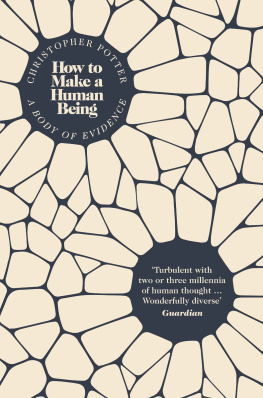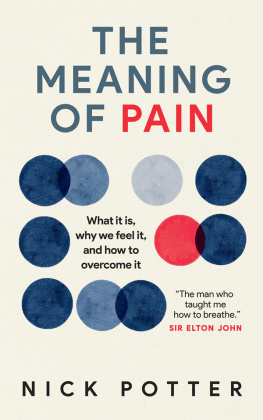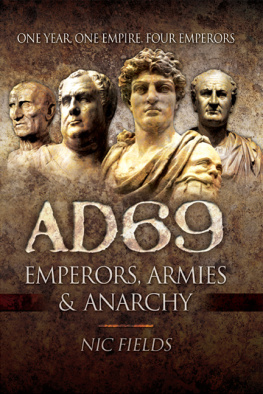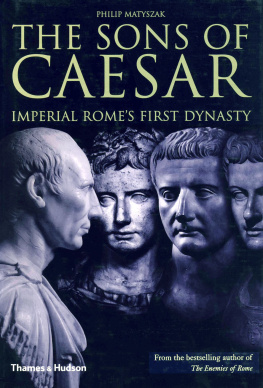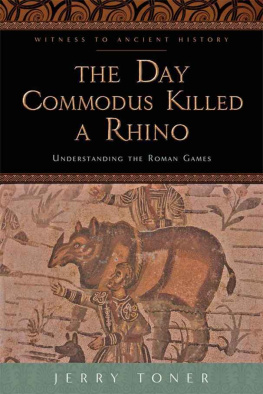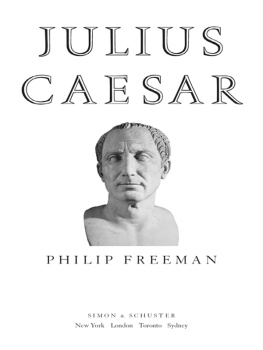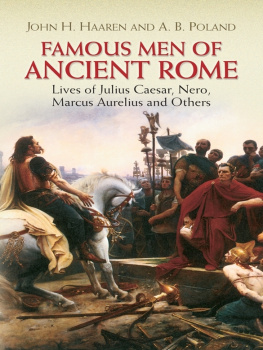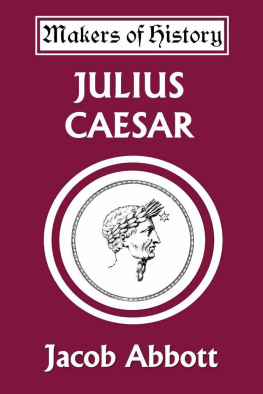Potter - The Emperors of Rome: Imperial Rome from Julius Caesar to the last emperor
Here you can read online Potter - The Emperors of Rome: Imperial Rome from Julius Caesar to the last emperor full text of the book (entire story) in english for free. Download pdf and epub, get meaning, cover and reviews about this ebook. City: Rome;Rome (Empire, year: 2014, publisher: Quercus, genre: Science. Description of the work, (preface) as well as reviews are available. Best literature library LitArk.com created for fans of good reading and offers a wide selection of genres:
Romance novel
Science fiction
Adventure
Detective
Science
History
Home and family
Prose
Art
Politics
Computer
Non-fiction
Religion
Business
Children
Humor
Choose a favorite category and find really read worthwhile books. Enjoy immersion in the world of imagination, feel the emotions of the characters or learn something new for yourself, make an fascinating discovery.

- Book:The Emperors of Rome: Imperial Rome from Julius Caesar to the last emperor
- Author:
- Publisher:Quercus
- Genre:
- Year:2014
- City:Rome;Rome (Empire
- Rating:3 / 5
- Favourites:Add to favourites
- Your mark:
- 60
- 1
- 2
- 3
- 4
- 5
The Emperors of Rome: Imperial Rome from Julius Caesar to the last emperor: summary, description and annotation
We offer to read an annotation, description, summary or preface (depends on what the author of the book "The Emperors of Rome: Imperial Rome from Julius Caesar to the last emperor" wrote himself). If you haven't found the necessary information about the book — write in the comments, we will try to find it.
Potter: author's other books
Who wrote The Emperors of Rome: Imperial Rome from Julius Caesar to the last emperor? Find out the surname, the name of the author of the book and a list of all author's works by series.
The Emperors of Rome: Imperial Rome from Julius Caesar to the last emperor — read online for free the complete book (whole text) full work
Below is the text of the book, divided by pages. System saving the place of the last page read, allows you to conveniently read the book "The Emperors of Rome: Imperial Rome from Julius Caesar to the last emperor" online for free, without having to search again every time where you left off. Put a bookmark, and you can go to the page where you finished reading at any time.
Font size:
Interval:
Bookmark:
THE STORY OF IMPERIAL ROME FROM JULIUS CAESAR TO THE LAST EMPEROR
DAVID POTTER

First published as an illustrated edition in Great Britain in 2007 by Quercus
This updated ebook edition published in 2013 by
Quercus Editions Ltd
55 Baker Street
Seventh Floor, South Block
London
W1U 8EW
Copyright 2007, 2013 David Potter
The moral right of David Potter to be identified as the author of this work has been asserted in accordance with the Copyright, Designs and Patents Act, 1988.
All rights reserved. No part of this publication may be reproduced or transmitted in any form or by any means, electronic or mechanical, including photocopy, recording, or any information storage and retrieval system, without permission in writing from the publisher.
A CIP catalogue record for this book is available from the British Library
Ebook ISBN 978 1 78087 336 7
Print ISBN 978 1 78087 750 1
You can find this and many other great books at:
www.quercusbooks.co.uk
David Potter is Francis W. Kelsey Collegiate Professor of Greek and Roman History and Arthur F. Thurnau Professor of Greek and Latin, in the Department of Classical Studies at the University of Michigan. He is the author of The Victors Crown, also published by Quercus.
ONE
Great Caesars Ghost
TWO
Caesars and Their Subjects
THREE
Reinventing Caesar
FOUR
Losing Caesar
Being Caesar
One murdered his mother. Another fought as a gladiator. Two were philosophers, while yet another is revered as a saint in the Eastern Orthodox Church. What all these diverse personalities had in common was that they were emperors of Rome. Given the extreme behaviour exhibited by many of the holders of this office, it is little wonder that much of the political comment that has come down to us from Ancient Rome focuses on individual personalities. In polemical tones all too familiar to modern ears, Romans lambasted their leaders as lunatics, murderers or imbeciles or lionized them as heroes or geniuses.
Roman political discourse also resembled that of the present day in judging leaders and their achievements by an ideal standard. In the light of this, it is worth considering for a moment what a job description for a prospective emperor might look like. Following the approved practice of human resources managers, in drafting this description we need to consult the best available literature, and keep in mind both the experience of previous holders and the needs of the organization. Aided by ancient works of political theory on kingship, and taking the average age of the incumbents as our yardstick of the level of experience required, we might well arrive at the following profile:
Wanted: Well-educated man in his late thirties
Key responsibilities: Ruling the known world; commanding the worlds most powerful army; preserving civilization as we know it
Applicants should possess:
- A keen legal mind
- Good interpersonal skills, especially in dealing with foreign peoples
- An ability to handle an enormous volume of communication and make clear policy decisions
- A proven ability in a senior military capacity, while not essential for the role, would be a distinct advantage
Diverting though this exercise is, two basic problems bedevil any attempt to quantify the role of Roman emperor. First, the job as outlined above is fundamentally impossible, and second the material that we used to construct our job description is misleading. In writing about the perfect emperor, the topic ancient commentators were actually addressing was the purpose of government. Emperors were representatives of the government as a whole, and the individual job description for each one might vary enormously from our norm. Even the notion of an ideal age for a new emperor is specious in practice they fell into roughly three age brackets: one starting at around the age of 60, one around 40, and one in the early teens. These were largely conditioned by the needs of the age. There were periods when Romans did not need their emperor to do very much at all, and yet other times when his services were in great demand.
It was quite remarkable that Romans should opt to be governed by emperors at all. Their state had done very well without a sole ruler and they were generally hostile to anything that smacked of kingship, for historical reasons that will presently become apparent. Moreover, temperamentally they were inclined to individualism, a trait which, when it has manifested itself in other societies, has sat uneasily with autocracy. Yet after hundreds of years of democracy, Romans found that their government could no longer keep pace with the speed of change and the special demands that came with being a superpower. Foremost among these demands was that government should remain responsive to the needs of the majority of the people and not be hijacked by special-interest groups. The government of the Roman Republic failed to do this, and fell victim to men who took advantage of its weaknesses to further their own ambitions. That said, the men who usurped power in this way still found it impossible to do away entirely with the traditions of collective government that had existed for centuries under the Republic. The result was that Roman emperors always remained part of a governing group. What is even more extraordinary, however, and distinguishes the Roman empire from many more modern such polities, was that the post of emperor was not reserved for people of Roman ancestry. Over time, it was filled by men from many different parts of the empire. Some only spoke Latin as a second language, while one was even the son of a freed slave.
At the root of these apparent idiosyncrasies of Romes imperial system lie certain ingrained Roman attitudes. Notable among these was the great emphasis that Romans placed on an individuals relations with the community at large, plus their tendency to gauge personal happiness in terms of how other members of society saw them. These factors had a crucial bearing on Romans perception of what it meant to be emperor.
The Roman fixation on communal participation is even enshrined in the official designation of the state the res publica populi Romani, or public possession of the Roman people. To be one of the people a citizen was therefore to be co-owner of an extraordinary entity. That said, not all the states joint owners were created equal; every persons standing was reflected in the level of service that they devoted to the state. Being a wealthy Roman entailed taking an active role in government, holding public office and serving in positions of command in the army alongside ones peers. Middle-class Romans also undertook military service, while their appointed political role was to sanction the position of their social betters by voting them into office and affirming the proposals they put forward to the states legislative bodies. The concept of serving the state even extended to the poor, who were expected to raise children and affirm the status quo by participating in the rituals of the state. To the Roman mind, there was nothing more abhorrent than the man who tried to shirk the duties that attended his station in life.
An essential quality required by a Roman citizen was that of virtus. Its English derivative virtue, defined as the quality or practice of moral excellence or righteousness, does not successfully convey the meaning of the Latin concept. To the Romans, the word
Font size:
Interval:
Bookmark:
Similar books «The Emperors of Rome: Imperial Rome from Julius Caesar to the last emperor»
Look at similar books to The Emperors of Rome: Imperial Rome from Julius Caesar to the last emperor. We have selected literature similar in name and meaning in the hope of providing readers with more options to find new, interesting, not yet read works.
Discussion, reviews of the book The Emperors of Rome: Imperial Rome from Julius Caesar to the last emperor and just readers' own opinions. Leave your comments, write what you think about the work, its meaning or the main characters. Specify what exactly you liked and what you didn't like, and why you think so.

